Systematic Review: Mental Toughness and Sports Performance, May 2020
VerifiedAdded on 2020/11/09
|44
|17330
|153
Report
AI Summary
This systematic review examines the critical role of mental toughness in professional sports performance. Conducted at University College Birmingham, the review analyzed articles from January 2004 to November 2019, focusing on the psychological elements of mental toughness, its importance for athletes, and its impact on performance across different competition levels. The study reviewed 18 articles, revealing that mentally tough athletes often exhibit problem-solving focus, high motivation, self-belief, and better coping mechanisms, which positively influence performance. However, some studies suggest that excessive mental toughness may lead to overtraining and increased injury risk. The review also explores the relationship between mental toughness and variables like practice hours and mental health, concluding that there is a strong positive association between mental toughness and sports performance, although many other factors can influence this relationship.
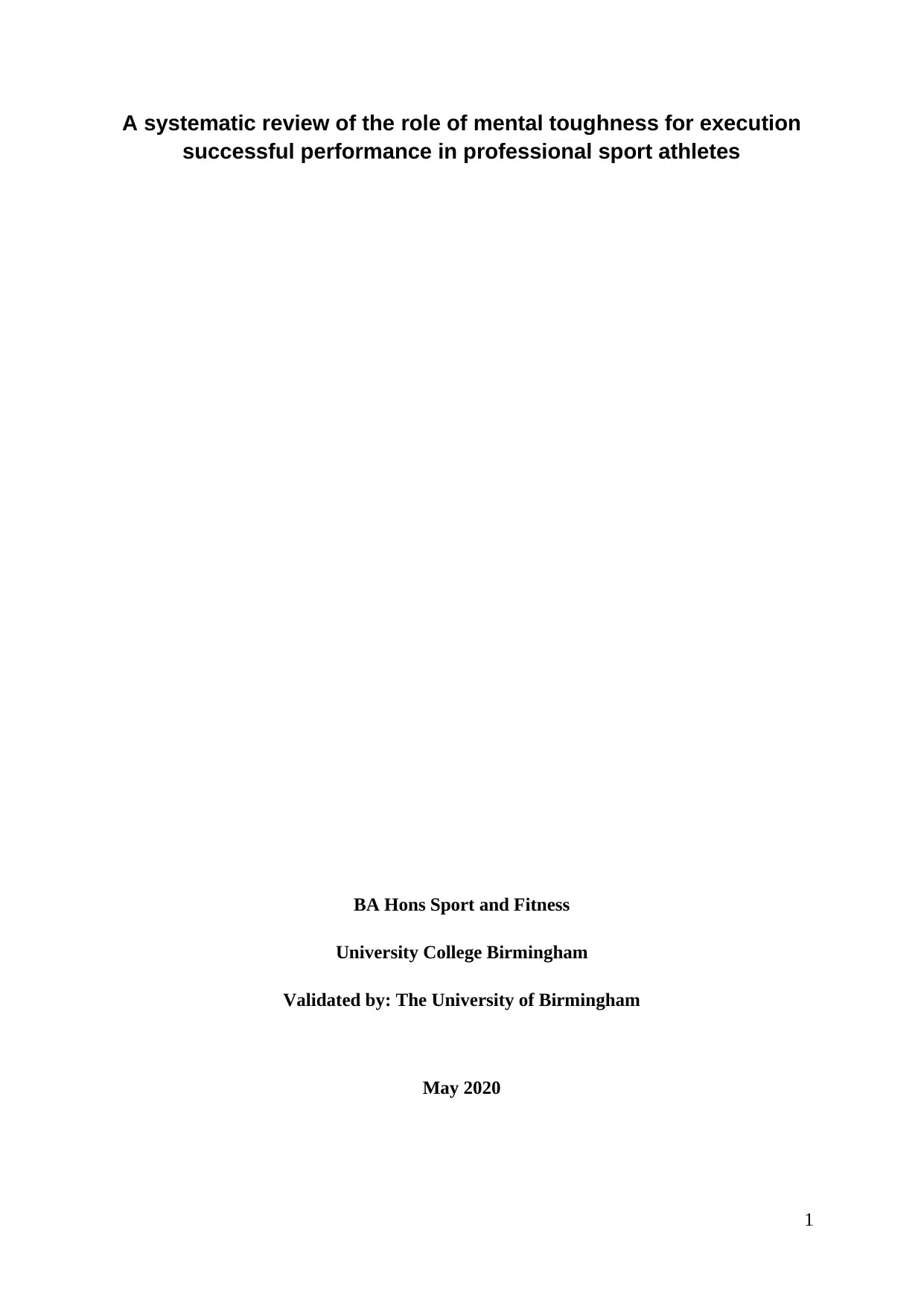
A systematic review of the role of mental toughness for execution
successful performance in professional sport athletes
BA Hons Sport and Fitness
University College Birmingham
Validated by: The University of Birmingham
May 2020
1
successful performance in professional sport athletes
BA Hons Sport and Fitness
University College Birmingham
Validated by: The University of Birmingham
May 2020
1
Paraphrase This Document
Need a fresh take? Get an instant paraphrase of this document with our AI Paraphraser
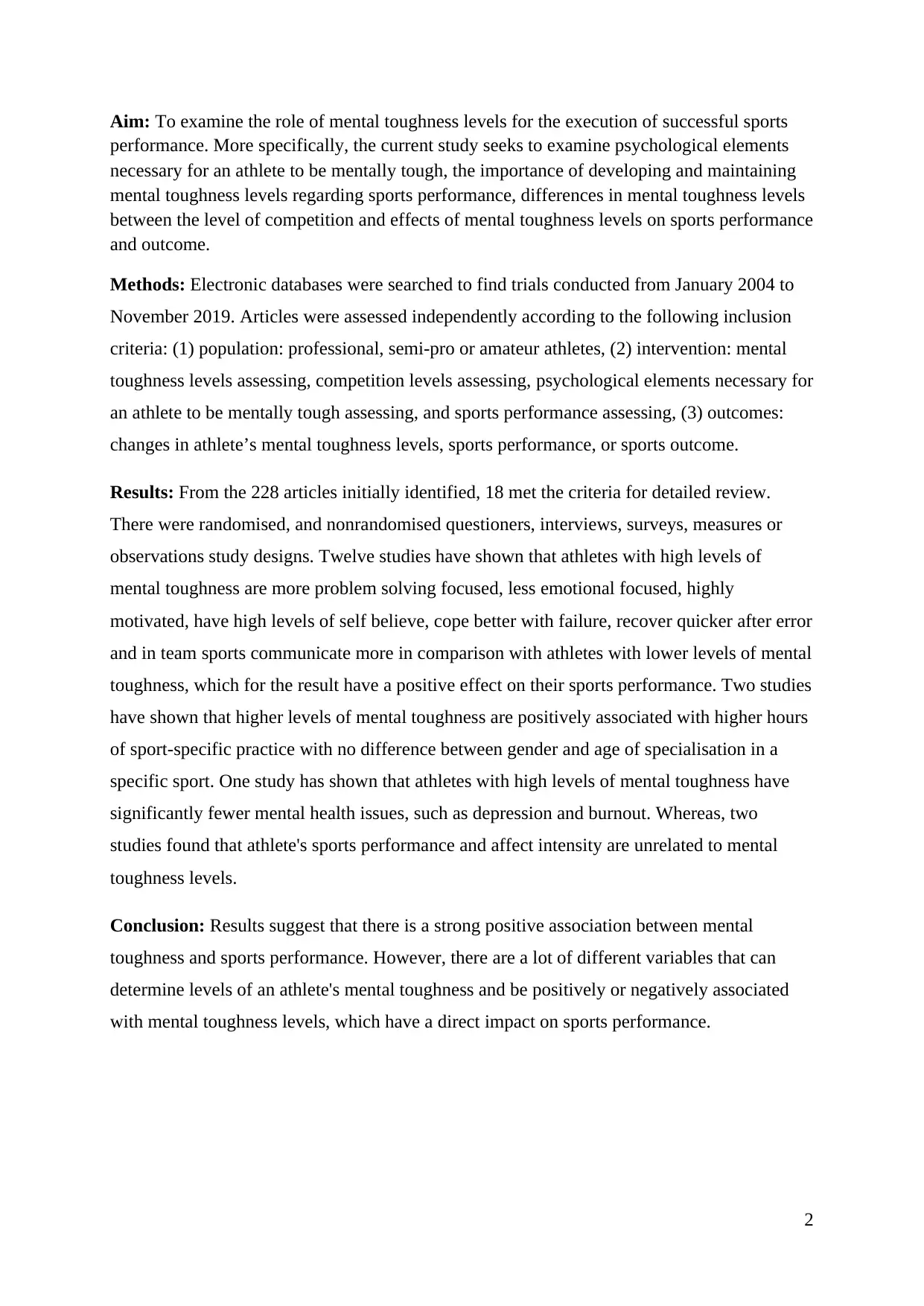
Aim: To examine the role of mental toughness levels for the execution of successful sports
performance. More specifically, the current study seeks to examine psychological elements
necessary for an athlete to be mentally tough, the importance of developing and maintaining
mental toughness levels regarding sports performance, differences in mental toughness levels
between the level of competition and effects of mental toughness levels on sports performance
and outcome.
Methods: Electronic databases were searched to find trials conducted from January 2004 to
November 2019. Articles were assessed independently according to the following inclusion
criteria: (1) population: professional, semi-pro or amateur athletes, (2) intervention: mental
toughness levels assessing, competition levels assessing, psychological elements necessary for
an athlete to be mentally tough assessing, and sports performance assessing, (3) outcomes:
changes in athlete’s mental toughness levels, sports performance, or sports outcome.
Results: From the 228 articles initially identified, 18 met the criteria for detailed review.
There were randomised, and nonrandomised questioners, interviews, surveys, measures or
observations study designs. Twelve studies have shown that athletes with high levels of
mental toughness are more problem solving focused, less emotional focused, highly
motivated, have high levels of self believe, cope better with failure, recover quicker after error
and in team sports communicate more in comparison with athletes with lower levels of mental
toughness, which for the result have a positive effect on their sports performance. Two studies
have shown that higher levels of mental toughness are positively associated with higher hours
of sport-specific practice with no difference between gender and age of specialisation in a
specific sport. One study has shown that athletes with high levels of mental toughness have
significantly fewer mental health issues, such as depression and burnout. Whereas, two
studies found that athlete's sports performance and affect intensity are unrelated to mental
toughness levels.
Conclusion: Results suggest that there is a strong positive association between mental
toughness and sports performance. However, there are a lot of different variables that can
determine levels of an athlete's mental toughness and be positively or negatively associated
with mental toughness levels, which have a direct impact on sports performance.
2
performance. More specifically, the current study seeks to examine psychological elements
necessary for an athlete to be mentally tough, the importance of developing and maintaining
mental toughness levels regarding sports performance, differences in mental toughness levels
between the level of competition and effects of mental toughness levels on sports performance
and outcome.
Methods: Electronic databases were searched to find trials conducted from January 2004 to
November 2019. Articles were assessed independently according to the following inclusion
criteria: (1) population: professional, semi-pro or amateur athletes, (2) intervention: mental
toughness levels assessing, competition levels assessing, psychological elements necessary for
an athlete to be mentally tough assessing, and sports performance assessing, (3) outcomes:
changes in athlete’s mental toughness levels, sports performance, or sports outcome.
Results: From the 228 articles initially identified, 18 met the criteria for detailed review.
There were randomised, and nonrandomised questioners, interviews, surveys, measures or
observations study designs. Twelve studies have shown that athletes with high levels of
mental toughness are more problem solving focused, less emotional focused, highly
motivated, have high levels of self believe, cope better with failure, recover quicker after error
and in team sports communicate more in comparison with athletes with lower levels of mental
toughness, which for the result have a positive effect on their sports performance. Two studies
have shown that higher levels of mental toughness are positively associated with higher hours
of sport-specific practice with no difference between gender and age of specialisation in a
specific sport. One study has shown that athletes with high levels of mental toughness have
significantly fewer mental health issues, such as depression and burnout. Whereas, two
studies found that athlete's sports performance and affect intensity are unrelated to mental
toughness levels.
Conclusion: Results suggest that there is a strong positive association between mental
toughness and sports performance. However, there are a lot of different variables that can
determine levels of an athlete's mental toughness and be positively or negatively associated
with mental toughness levels, which have a direct impact on sports performance.
2
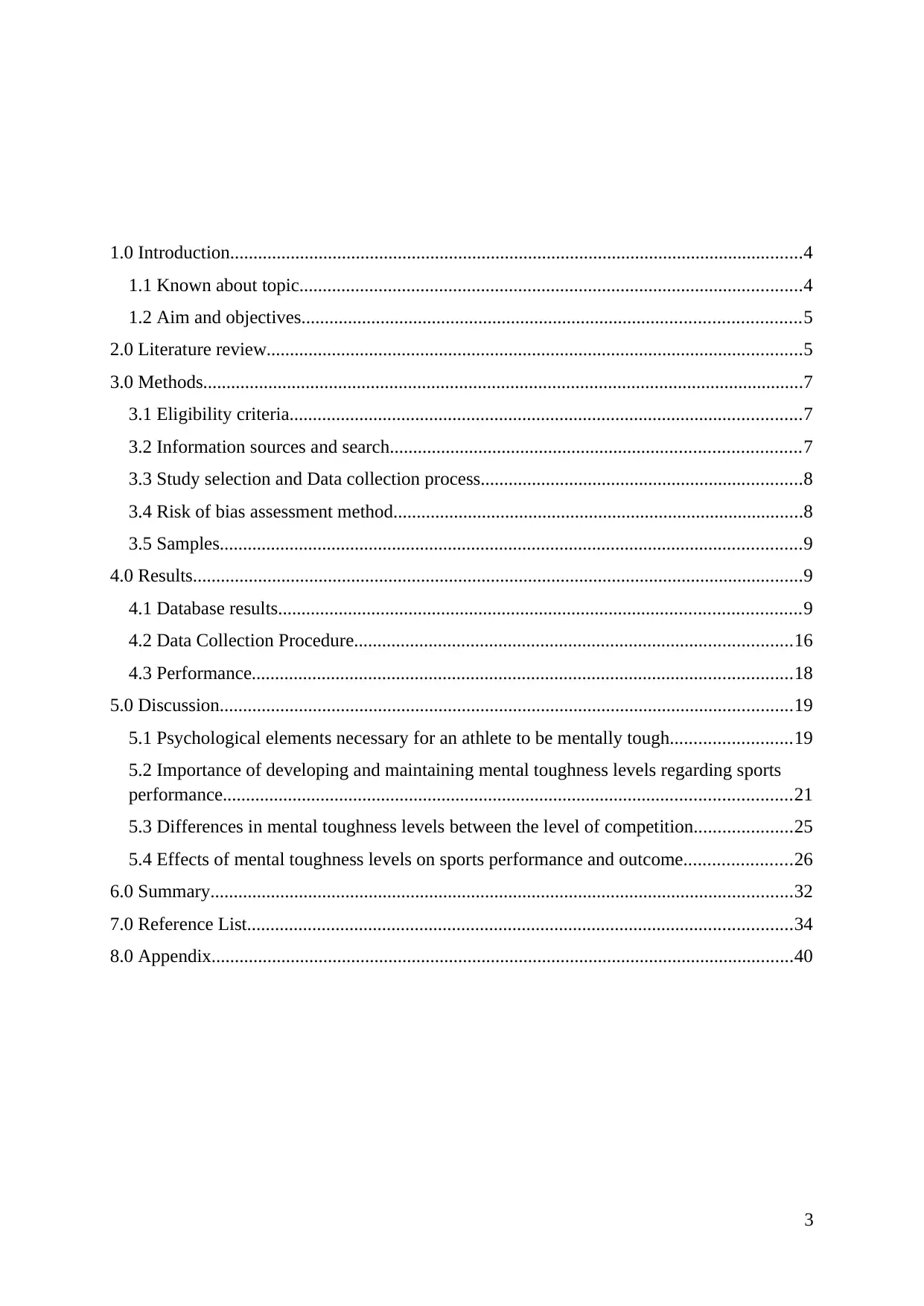
1.0 Introduction...........................................................................................................................4
1.1 Known about topic............................................................................................................4
1.2 Aim and objectives...........................................................................................................5
2.0 Literature review...................................................................................................................5
3.0 Methods.................................................................................................................................7
3.1 Eligibility criteria..............................................................................................................7
3.2 Information sources and search........................................................................................7
3.3 Study selection and Data collection process.....................................................................8
3.4 Risk of bias assessment method........................................................................................8
3.5 Samples.............................................................................................................................9
4.0 Results...................................................................................................................................9
4.1 Database results................................................................................................................9
4.2 Data Collection Procedure..............................................................................................16
4.3 Performance....................................................................................................................18
5.0 Discussion...........................................................................................................................19
5.1 Psychological elements necessary for an athlete to be mentally tough..........................19
5.2 Importance of developing and maintaining mental toughness levels regarding sports
performance..........................................................................................................................21
5.3 Differences in mental toughness levels between the level of competition.....................25
5.4 Effects of mental toughness levels on sports performance and outcome.......................26
6.0 Summary.............................................................................................................................32
7.0 Reference List.....................................................................................................................34
8.0 Appendix.............................................................................................................................40
3
1.1 Known about topic............................................................................................................4
1.2 Aim and objectives...........................................................................................................5
2.0 Literature review...................................................................................................................5
3.0 Methods.................................................................................................................................7
3.1 Eligibility criteria..............................................................................................................7
3.2 Information sources and search........................................................................................7
3.3 Study selection and Data collection process.....................................................................8
3.4 Risk of bias assessment method........................................................................................8
3.5 Samples.............................................................................................................................9
4.0 Results...................................................................................................................................9
4.1 Database results................................................................................................................9
4.2 Data Collection Procedure..............................................................................................16
4.3 Performance....................................................................................................................18
5.0 Discussion...........................................................................................................................19
5.1 Psychological elements necessary for an athlete to be mentally tough..........................19
5.2 Importance of developing and maintaining mental toughness levels regarding sports
performance..........................................................................................................................21
5.3 Differences in mental toughness levels between the level of competition.....................25
5.4 Effects of mental toughness levels on sports performance and outcome.......................26
6.0 Summary.............................................................................................................................32
7.0 Reference List.....................................................................................................................34
8.0 Appendix.............................................................................................................................40
3
⊘ This is a preview!⊘
Do you want full access?
Subscribe today to unlock all pages.

Trusted by 1+ million students worldwide
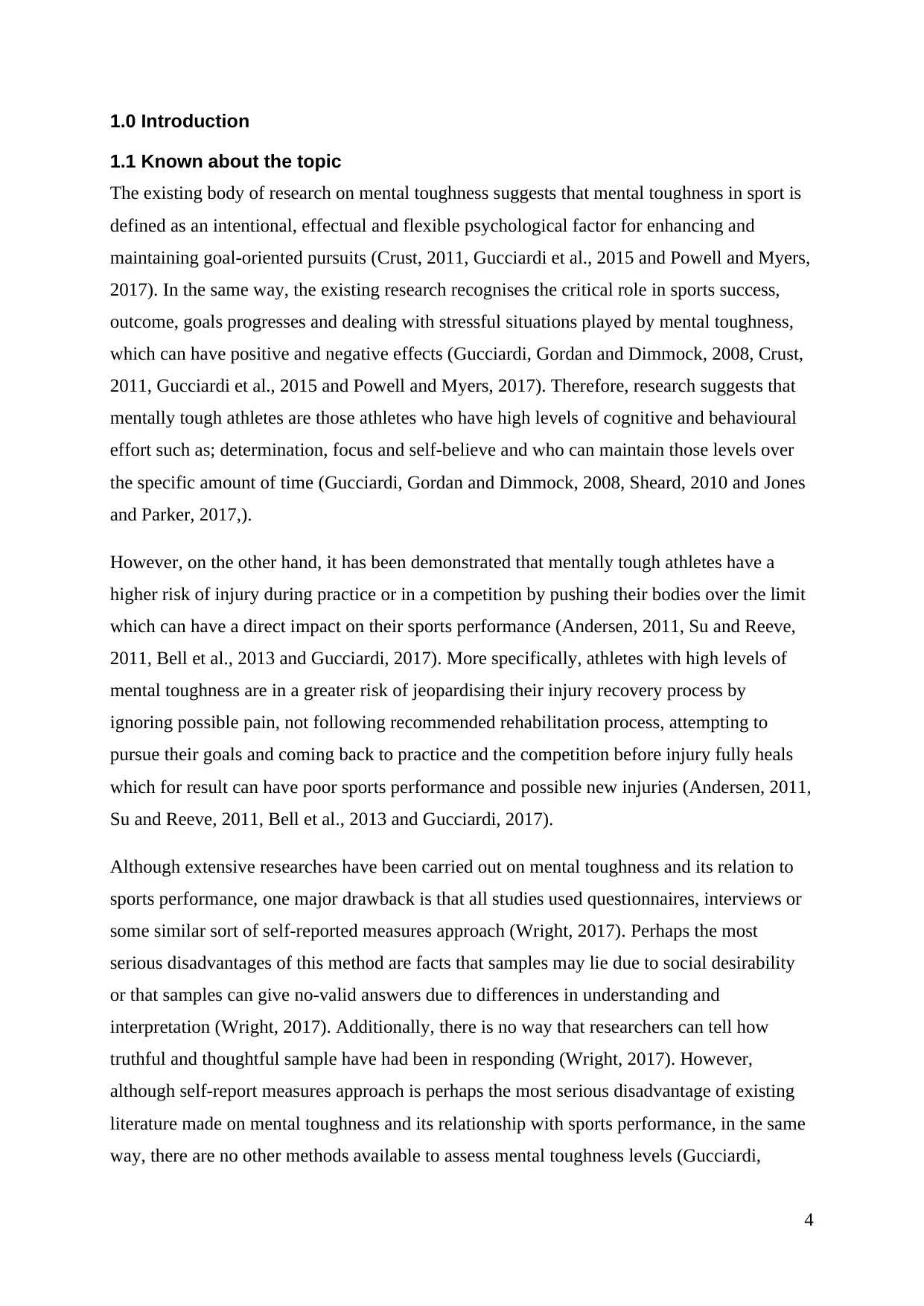
1.0 Introduction
1.1 Known about the topic
The existing body of research on mental toughness suggests that mental toughness in sport is
defined as an intentional, effectual and flexible psychological factor for enhancing and
maintaining goal-oriented pursuits (Crust, 2011, Gucciardi et al., 2015 and Powell and Myers,
2017). In the same way, the existing research recognises the critical role in sports success,
outcome, goals progresses and dealing with stressful situations played by mental toughness,
which can have positive and negative effects (Gucciardi, Gordan and Dimmock, 2008, Crust,
2011, Gucciardi et al., 2015 and Powell and Myers, 2017). Therefore, research suggests that
mentally tough athletes are those athletes who have high levels of cognitive and behavioural
effort such as; determination, focus and self-believe and who can maintain those levels over
the specific amount of time (Gucciardi, Gordan and Dimmock, 2008, Sheard, 2010 and Jones
and Parker, 2017,).
However, on the other hand, it has been demonstrated that mentally tough athletes have a
higher risk of injury during practice or in a competition by pushing their bodies over the limit
which can have a direct impact on their sports performance (Andersen, 2011, Su and Reeve,
2011, Bell et al., 2013 and Gucciardi, 2017). More specifically, athletes with high levels of
mental toughness are in a greater risk of jeopardising their injury recovery process by
ignoring possible pain, not following recommended rehabilitation process, attempting to
pursue their goals and coming back to practice and the competition before injury fully heals
which for result can have poor sports performance and possible new injuries (Andersen, 2011,
Su and Reeve, 2011, Bell et al., 2013 and Gucciardi, 2017).
Although extensive researches have been carried out on mental toughness and its relation to
sports performance, one major drawback is that all studies used questionnaires, interviews or
some similar sort of self-reported measures approach (Wright, 2017). Perhaps the most
serious disadvantages of this method are facts that samples may lie due to social desirability
or that samples can give no-valid answers due to differences in understanding and
interpretation (Wright, 2017). Additionally, there is no way that researchers can tell how
truthful and thoughtful sample have had been in responding (Wright, 2017). However,
although self-report measures approach is perhaps the most serious disadvantage of existing
literature made on mental toughness and its relationship with sports performance, in the same
way, there are no other methods available to assess mental toughness levels (Gucciardi,
4
1.1 Known about the topic
The existing body of research on mental toughness suggests that mental toughness in sport is
defined as an intentional, effectual and flexible psychological factor for enhancing and
maintaining goal-oriented pursuits (Crust, 2011, Gucciardi et al., 2015 and Powell and Myers,
2017). In the same way, the existing research recognises the critical role in sports success,
outcome, goals progresses and dealing with stressful situations played by mental toughness,
which can have positive and negative effects (Gucciardi, Gordan and Dimmock, 2008, Crust,
2011, Gucciardi et al., 2015 and Powell and Myers, 2017). Therefore, research suggests that
mentally tough athletes are those athletes who have high levels of cognitive and behavioural
effort such as; determination, focus and self-believe and who can maintain those levels over
the specific amount of time (Gucciardi, Gordan and Dimmock, 2008, Sheard, 2010 and Jones
and Parker, 2017,).
However, on the other hand, it has been demonstrated that mentally tough athletes have a
higher risk of injury during practice or in a competition by pushing their bodies over the limit
which can have a direct impact on their sports performance (Andersen, 2011, Su and Reeve,
2011, Bell et al., 2013 and Gucciardi, 2017). More specifically, athletes with high levels of
mental toughness are in a greater risk of jeopardising their injury recovery process by
ignoring possible pain, not following recommended rehabilitation process, attempting to
pursue their goals and coming back to practice and the competition before injury fully heals
which for result can have poor sports performance and possible new injuries (Andersen, 2011,
Su and Reeve, 2011, Bell et al., 2013 and Gucciardi, 2017).
Although extensive researches have been carried out on mental toughness and its relation to
sports performance, one major drawback is that all studies used questionnaires, interviews or
some similar sort of self-reported measures approach (Wright, 2017). Perhaps the most
serious disadvantages of this method are facts that samples may lie due to social desirability
or that samples can give no-valid answers due to differences in understanding and
interpretation (Wright, 2017). Additionally, there is no way that researchers can tell how
truthful and thoughtful sample have had been in responding (Wright, 2017). However,
although self-report measures approach is perhaps the most serious disadvantage of existing
literature made on mental toughness and its relationship with sports performance, in the same
way, there are no other methods available to assess mental toughness levels (Gucciardi,
4
Paraphrase This Document
Need a fresh take? Get an instant paraphrase of this document with our AI Paraphraser
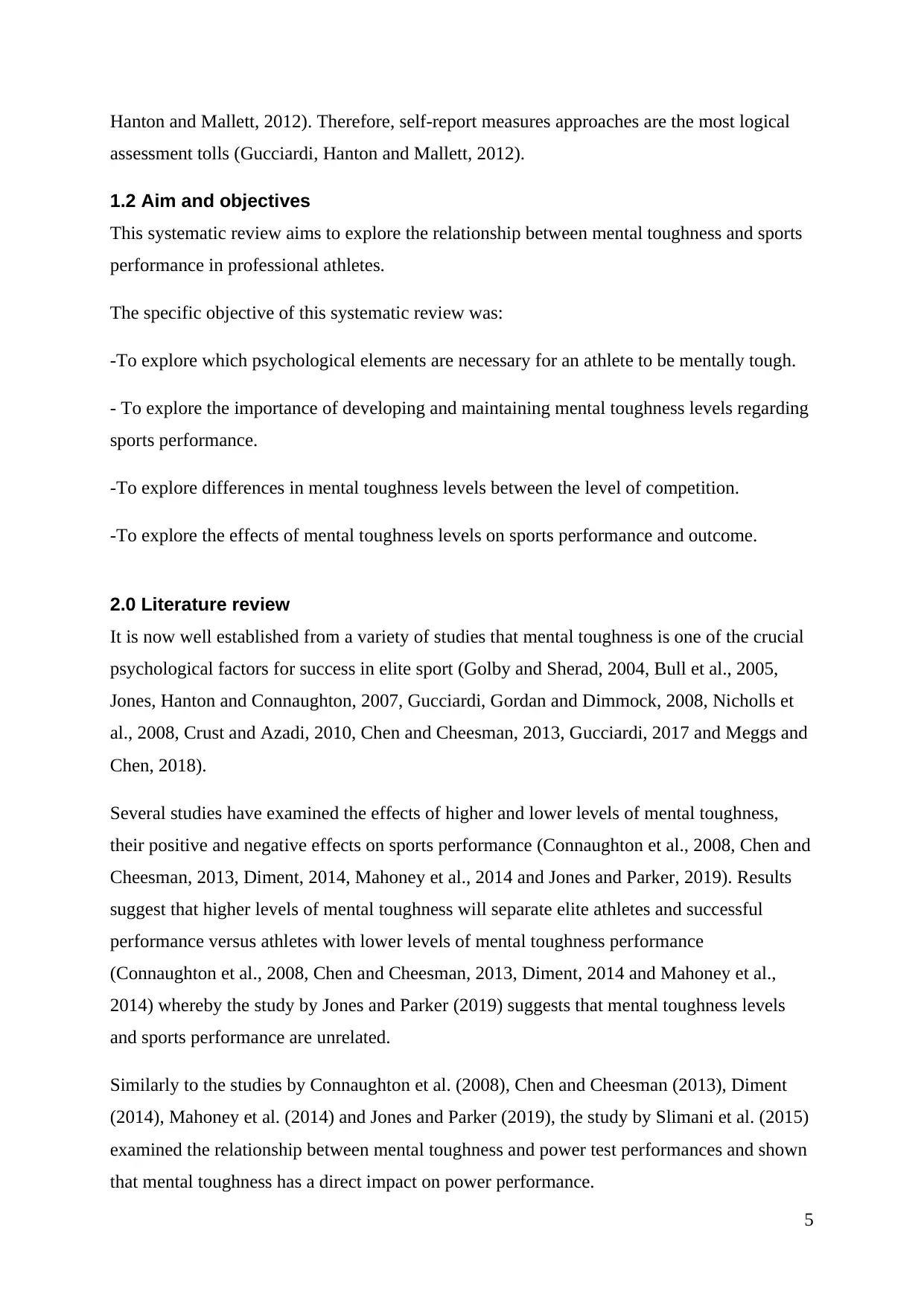
Hanton and Mallett, 2012). Therefore, self-report measures approaches are the most logical
assessment tolls (Gucciardi, Hanton and Mallett, 2012).
1.2 Aim and objectives
This systematic review aims to explore the relationship between mental toughness and sports
performance in professional athletes.
The specific objective of this systematic review was:
-To explore which psychological elements are necessary for an athlete to be mentally tough.
- To explore the importance of developing and maintaining mental toughness levels regarding
sports performance.
-To explore differences in mental toughness levels between the level of competition.
-To explore the effects of mental toughness levels on sports performance and outcome.
2.0 Literature review
It is now well established from a variety of studies that mental toughness is one of the crucial
psychological factors for success in elite sport (Golby and Sherad, 2004, Bull et al., 2005,
Jones, Hanton and Connaughton, 2007, Gucciardi, Gordan and Dimmock, 2008, Nicholls et
al., 2008, Crust and Azadi, 2010, Chen and Cheesman, 2013, Gucciardi, 2017 and Meggs and
Chen, 2018).
Several studies have examined the effects of higher and lower levels of mental toughness,
their positive and negative effects on sports performance (Connaughton et al., 2008, Chen and
Cheesman, 2013, Diment, 2014, Mahoney et al., 2014 and Jones and Parker, 2019). Results
suggest that higher levels of mental toughness will separate elite athletes and successful
performance versus athletes with lower levels of mental toughness performance
(Connaughton et al., 2008, Chen and Cheesman, 2013, Diment, 2014 and Mahoney et al.,
2014) whereby the study by Jones and Parker (2019) suggests that mental toughness levels
and sports performance are unrelated.
Similarly to the studies by Connaughton et al. (2008), Chen and Cheesman (2013), Diment
(2014), Mahoney et al. (2014) and Jones and Parker (2019), the study by Slimani et al. (2015)
examined the relationship between mental toughness and power test performances and shown
that mental toughness has a direct impact on power performance.
5
assessment tolls (Gucciardi, Hanton and Mallett, 2012).
1.2 Aim and objectives
This systematic review aims to explore the relationship between mental toughness and sports
performance in professional athletes.
The specific objective of this systematic review was:
-To explore which psychological elements are necessary for an athlete to be mentally tough.
- To explore the importance of developing and maintaining mental toughness levels regarding
sports performance.
-To explore differences in mental toughness levels between the level of competition.
-To explore the effects of mental toughness levels on sports performance and outcome.
2.0 Literature review
It is now well established from a variety of studies that mental toughness is one of the crucial
psychological factors for success in elite sport (Golby and Sherad, 2004, Bull et al., 2005,
Jones, Hanton and Connaughton, 2007, Gucciardi, Gordan and Dimmock, 2008, Nicholls et
al., 2008, Crust and Azadi, 2010, Chen and Cheesman, 2013, Gucciardi, 2017 and Meggs and
Chen, 2018).
Several studies have examined the effects of higher and lower levels of mental toughness,
their positive and negative effects on sports performance (Connaughton et al., 2008, Chen and
Cheesman, 2013, Diment, 2014, Mahoney et al., 2014 and Jones and Parker, 2019). Results
suggest that higher levels of mental toughness will separate elite athletes and successful
performance versus athletes with lower levels of mental toughness performance
(Connaughton et al., 2008, Chen and Cheesman, 2013, Diment, 2014 and Mahoney et al.,
2014) whereby the study by Jones and Parker (2019) suggests that mental toughness levels
and sports performance are unrelated.
Similarly to the studies by Connaughton et al. (2008), Chen and Cheesman (2013), Diment
(2014), Mahoney et al. (2014) and Jones and Parker (2019), the study by Slimani et al. (2015)
examined the relationship between mental toughness and power test performances and shown
that mental toughness has a direct impact on power performance.
5
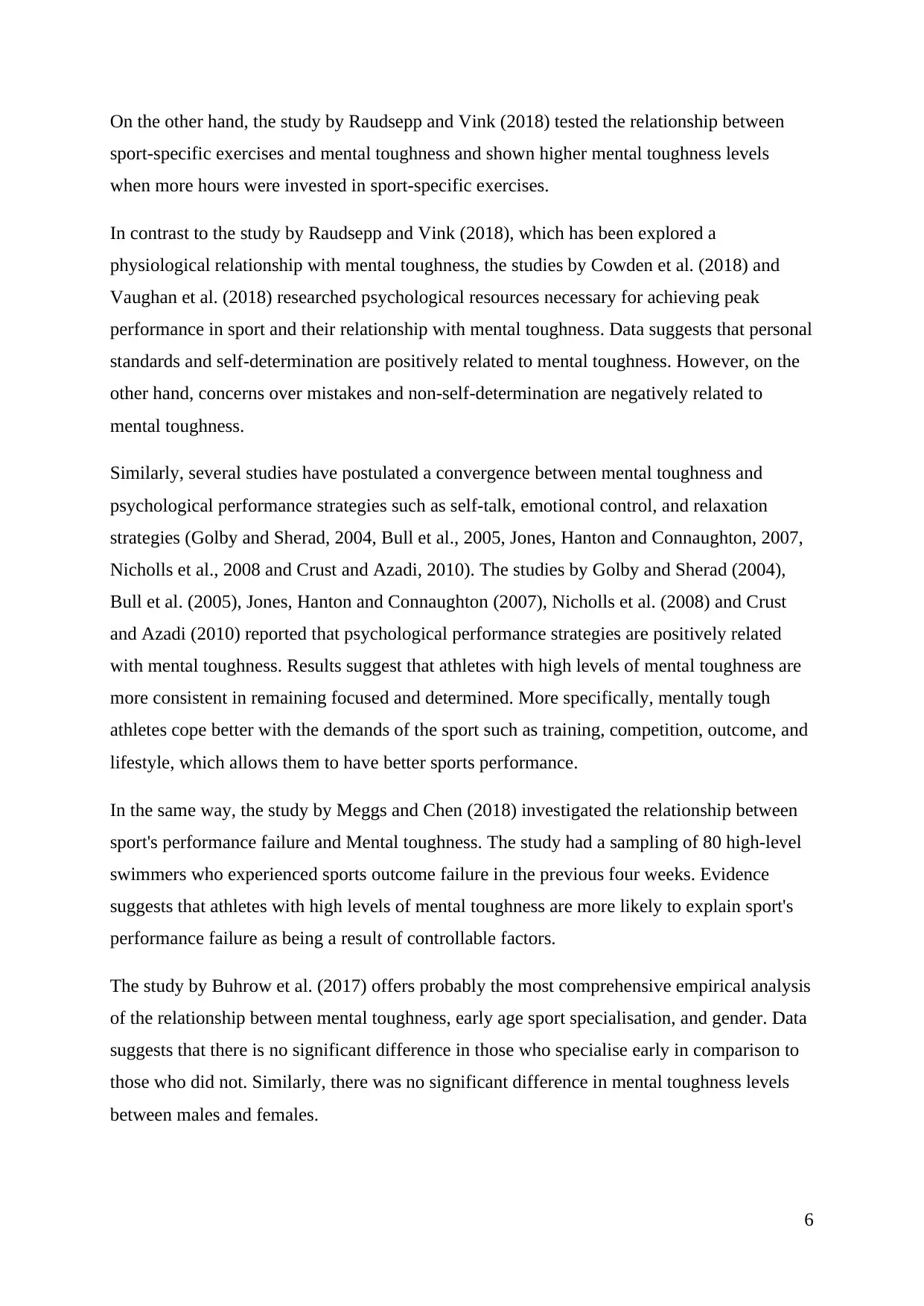
On the other hand, the study by Raudsepp and Vink (2018) tested the relationship between
sport-specific exercises and mental toughness and shown higher mental toughness levels
when more hours were invested in sport-specific exercises.
In contrast to the study by Raudsepp and Vink (2018), which has been explored a
physiological relationship with mental toughness, the studies by Cowden et al. (2018) and
Vaughan et al. (2018) researched psychological resources necessary for achieving peak
performance in sport and their relationship with mental toughness. Data suggests that personal
standards and self-determination are positively related to mental toughness. However, on the
other hand, concerns over mistakes and non-self-determination are negatively related to
mental toughness.
Similarly, several studies have postulated a convergence between mental toughness and
psychological performance strategies such as self-talk, emotional control, and relaxation
strategies (Golby and Sherad, 2004, Bull et al., 2005, Jones, Hanton and Connaughton, 2007,
Nicholls et al., 2008 and Crust and Azadi, 2010). The studies by Golby and Sherad (2004),
Bull et al. (2005), Jones, Hanton and Connaughton (2007), Nicholls et al. (2008) and Crust
and Azadi (2010) reported that psychological performance strategies are positively related
with mental toughness. Results suggest that athletes with high levels of mental toughness are
more consistent in remaining focused and determined. More specifically, mentally tough
athletes cope better with the demands of the sport such as training, competition, outcome, and
lifestyle, which allows them to have better sports performance.
In the same way, the study by Meggs and Chen (2018) investigated the relationship between
sport's performance failure and Mental toughness. The study had a sampling of 80 high-level
swimmers who experienced sports outcome failure in the previous four weeks. Evidence
suggests that athletes with high levels of mental toughness are more likely to explain sport's
performance failure as being a result of controllable factors.
The study by Buhrow et al. (2017) offers probably the most comprehensive empirical analysis
of the relationship between mental toughness, early age sport specialisation, and gender. Data
suggests that there is no significant difference in those who specialise early in comparison to
those who did not. Similarly, there was no significant difference in mental toughness levels
between males and females.
6
sport-specific exercises and mental toughness and shown higher mental toughness levels
when more hours were invested in sport-specific exercises.
In contrast to the study by Raudsepp and Vink (2018), which has been explored a
physiological relationship with mental toughness, the studies by Cowden et al. (2018) and
Vaughan et al. (2018) researched psychological resources necessary for achieving peak
performance in sport and their relationship with mental toughness. Data suggests that personal
standards and self-determination are positively related to mental toughness. However, on the
other hand, concerns over mistakes and non-self-determination are negatively related to
mental toughness.
Similarly, several studies have postulated a convergence between mental toughness and
psychological performance strategies such as self-talk, emotional control, and relaxation
strategies (Golby and Sherad, 2004, Bull et al., 2005, Jones, Hanton and Connaughton, 2007,
Nicholls et al., 2008 and Crust and Azadi, 2010). The studies by Golby and Sherad (2004),
Bull et al. (2005), Jones, Hanton and Connaughton (2007), Nicholls et al. (2008) and Crust
and Azadi (2010) reported that psychological performance strategies are positively related
with mental toughness. Results suggest that athletes with high levels of mental toughness are
more consistent in remaining focused and determined. More specifically, mentally tough
athletes cope better with the demands of the sport such as training, competition, outcome, and
lifestyle, which allows them to have better sports performance.
In the same way, the study by Meggs and Chen (2018) investigated the relationship between
sport's performance failure and Mental toughness. The study had a sampling of 80 high-level
swimmers who experienced sports outcome failure in the previous four weeks. Evidence
suggests that athletes with high levels of mental toughness are more likely to explain sport's
performance failure as being a result of controllable factors.
The study by Buhrow et al. (2017) offers probably the most comprehensive empirical analysis
of the relationship between mental toughness, early age sport specialisation, and gender. Data
suggests that there is no significant difference in those who specialise early in comparison to
those who did not. Similarly, there was no significant difference in mental toughness levels
between males and females.
6
⊘ This is a preview!⊘
Do you want full access?
Subscribe today to unlock all pages.

Trusted by 1+ million students worldwide
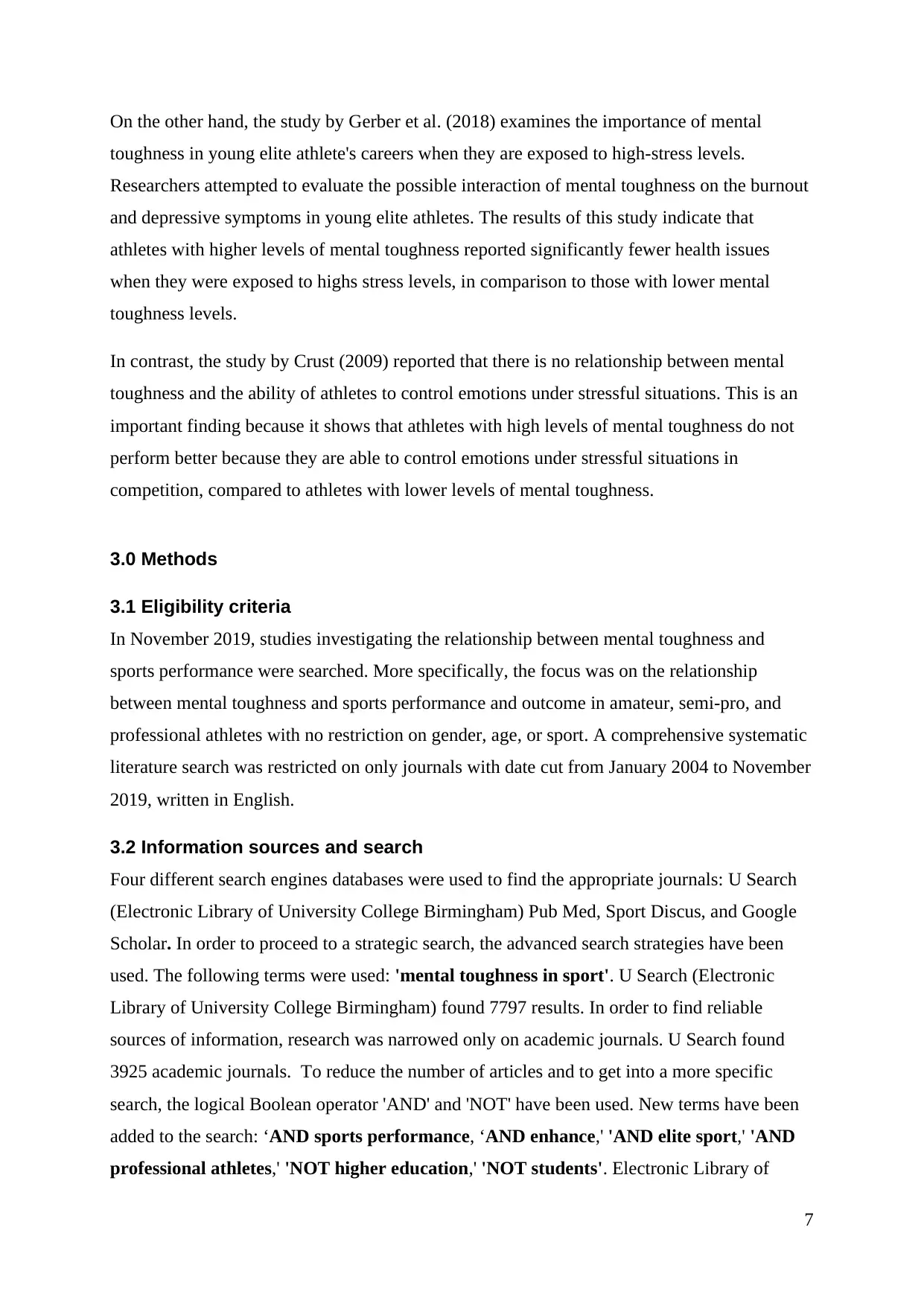
On the other hand, the study by Gerber et al. (2018) examines the importance of mental
toughness in young elite athlete's careers when they are exposed to high-stress levels.
Researchers attempted to evaluate the possible interaction of mental toughness on the burnout
and depressive symptoms in young elite athletes. The results of this study indicate that
athletes with higher levels of mental toughness reported significantly fewer health issues
when they were exposed to highs stress levels, in comparison to those with lower mental
toughness levels.
In contrast, the study by Crust (2009) reported that there is no relationship between mental
toughness and the ability of athletes to control emotions under stressful situations. This is an
important finding because it shows that athletes with high levels of mental toughness do not
perform better because they are able to control emotions under stressful situations in
competition, compared to athletes with lower levels of mental toughness.
3.0 Methods
3.1 Eligibility criteria
In November 2019, studies investigating the relationship between mental toughness and
sports performance were searched. More specifically, the focus was on the relationship
between mental toughness and sports performance and outcome in amateur, semi-pro, and
professional athletes with no restriction on gender, age, or sport. A comprehensive systematic
literature search was restricted on only journals with date cut from January 2004 to November
2019, written in English.
3.2 Information sources and search
Four different search engines databases were used to find the appropriate journals: U Search
(Electronic Library of University College Birmingham) Pub Med, Sport Discus, and Google
Scholar. In order to proceed to a strategic search, the advanced search strategies have been
used. The following terms were used: 'mental toughness in sport'. U Search (Electronic
Library of University College Birmingham) found 7797 results. In order to find reliable
sources of information, research was narrowed only on academic journals. U Search found
3925 academic journals. To reduce the number of articles and to get into a more specific
search, the logical Boolean operator 'AND' and 'NOT' have been used. New terms have been
added to the search: ‘AND sports performance, ‘AND enhance,' 'AND elite sport,' 'AND
professional athletes,' 'NOT higher education,' 'NOT students'. Electronic Library of
7
toughness in young elite athlete's careers when they are exposed to high-stress levels.
Researchers attempted to evaluate the possible interaction of mental toughness on the burnout
and depressive symptoms in young elite athletes. The results of this study indicate that
athletes with higher levels of mental toughness reported significantly fewer health issues
when they were exposed to highs stress levels, in comparison to those with lower mental
toughness levels.
In contrast, the study by Crust (2009) reported that there is no relationship between mental
toughness and the ability of athletes to control emotions under stressful situations. This is an
important finding because it shows that athletes with high levels of mental toughness do not
perform better because they are able to control emotions under stressful situations in
competition, compared to athletes with lower levels of mental toughness.
3.0 Methods
3.1 Eligibility criteria
In November 2019, studies investigating the relationship between mental toughness and
sports performance were searched. More specifically, the focus was on the relationship
between mental toughness and sports performance and outcome in amateur, semi-pro, and
professional athletes with no restriction on gender, age, or sport. A comprehensive systematic
literature search was restricted on only journals with date cut from January 2004 to November
2019, written in English.
3.2 Information sources and search
Four different search engines databases were used to find the appropriate journals: U Search
(Electronic Library of University College Birmingham) Pub Med, Sport Discus, and Google
Scholar. In order to proceed to a strategic search, the advanced search strategies have been
used. The following terms were used: 'mental toughness in sport'. U Search (Electronic
Library of University College Birmingham) found 7797 results. In order to find reliable
sources of information, research was narrowed only on academic journals. U Search found
3925 academic journals. To reduce the number of articles and to get into a more specific
search, the logical Boolean operator 'AND' and 'NOT' have been used. New terms have been
added to the search: ‘AND sports performance, ‘AND enhance,' 'AND elite sport,' 'AND
professional athletes,' 'NOT higher education,' 'NOT students'. Electronic Library of
7
Paraphrase This Document
Need a fresh take? Get an instant paraphrase of this document with our AI Paraphraser
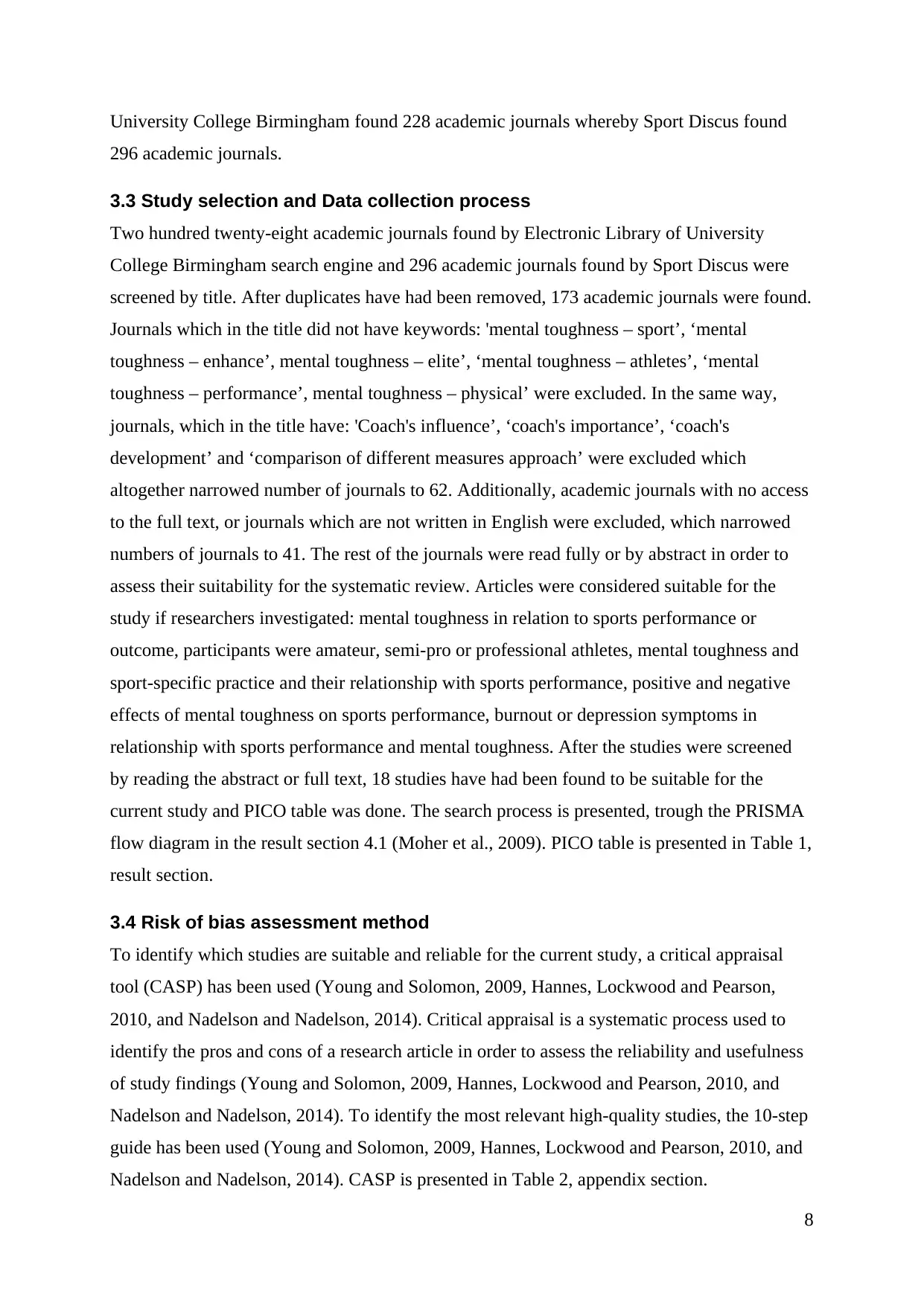
University College Birmingham found 228 academic journals whereby Sport Discus found
296 academic journals.
3.3 Study selection and Data collection process
Two hundred twenty-eight academic journals found by Electronic Library of University
College Birmingham search engine and 296 academic journals found by Sport Discus were
screened by title. After duplicates have had been removed, 173 academic journals were found.
Journals which in the title did not have keywords: 'mental toughness – sport’, ‘mental
toughness – enhance’, mental toughness – elite’, ‘mental toughness – athletes’, ‘mental
toughness – performance’, mental toughness – physical’ were excluded. In the same way,
journals, which in the title have: 'Coach's influence’, ‘coach's importance’, ‘coach's
development’ and ‘comparison of different measures approach’ were excluded which
altogether narrowed number of journals to 62. Additionally, academic journals with no access
to the full text, or journals which are not written in English were excluded, which narrowed
numbers of journals to 41. The rest of the journals were read fully or by abstract in order to
assess their suitability for the systematic review. Articles were considered suitable for the
study if researchers investigated: mental toughness in relation to sports performance or
outcome, participants were amateur, semi-pro or professional athletes, mental toughness and
sport-specific practice and their relationship with sports performance, positive and negative
effects of mental toughness on sports performance, burnout or depression symptoms in
relationship with sports performance and mental toughness. After the studies were screened
by reading the abstract or full text, 18 studies have had been found to be suitable for the
current study and PICO table was done. The search process is presented, trough the PRISMA
flow diagram in the result section 4.1 (Moher et al., 2009). PICO table is presented in Table 1,
result section.
3.4 Risk of bias assessment method
To identify which studies are suitable and reliable for the current study, a critical appraisal
tool (CASP) has been used (Young and Solomon, 2009, Hannes, Lockwood and Pearson,
2010, and Nadelson and Nadelson, 2014). Critical appraisal is a systematic process used to
identify the pros and cons of a research article in order to assess the reliability and usefulness
of study findings (Young and Solomon, 2009, Hannes, Lockwood and Pearson, 2010, and
Nadelson and Nadelson, 2014). To identify the most relevant high-quality studies, the 10-step
guide has been used (Young and Solomon, 2009, Hannes, Lockwood and Pearson, 2010, and
Nadelson and Nadelson, 2014). CASP is presented in Table 2, appendix section.
8
296 academic journals.
3.3 Study selection and Data collection process
Two hundred twenty-eight academic journals found by Electronic Library of University
College Birmingham search engine and 296 academic journals found by Sport Discus were
screened by title. After duplicates have had been removed, 173 academic journals were found.
Journals which in the title did not have keywords: 'mental toughness – sport’, ‘mental
toughness – enhance’, mental toughness – elite’, ‘mental toughness – athletes’, ‘mental
toughness – performance’, mental toughness – physical’ were excluded. In the same way,
journals, which in the title have: 'Coach's influence’, ‘coach's importance’, ‘coach's
development’ and ‘comparison of different measures approach’ were excluded which
altogether narrowed number of journals to 62. Additionally, academic journals with no access
to the full text, or journals which are not written in English were excluded, which narrowed
numbers of journals to 41. The rest of the journals were read fully or by abstract in order to
assess their suitability for the systematic review. Articles were considered suitable for the
study if researchers investigated: mental toughness in relation to sports performance or
outcome, participants were amateur, semi-pro or professional athletes, mental toughness and
sport-specific practice and their relationship with sports performance, positive and negative
effects of mental toughness on sports performance, burnout or depression symptoms in
relationship with sports performance and mental toughness. After the studies were screened
by reading the abstract or full text, 18 studies have had been found to be suitable for the
current study and PICO table was done. The search process is presented, trough the PRISMA
flow diagram in the result section 4.1 (Moher et al., 2009). PICO table is presented in Table 1,
result section.
3.4 Risk of bias assessment method
To identify which studies are suitable and reliable for the current study, a critical appraisal
tool (CASP) has been used (Young and Solomon, 2009, Hannes, Lockwood and Pearson,
2010, and Nadelson and Nadelson, 2014). Critical appraisal is a systematic process used to
identify the pros and cons of a research article in order to assess the reliability and usefulness
of study findings (Young and Solomon, 2009, Hannes, Lockwood and Pearson, 2010, and
Nadelson and Nadelson, 2014). To identify the most relevant high-quality studies, the 10-step
guide has been used (Young and Solomon, 2009, Hannes, Lockwood and Pearson, 2010, and
Nadelson and Nadelson, 2014). CASP is presented in Table 2, appendix section.
8
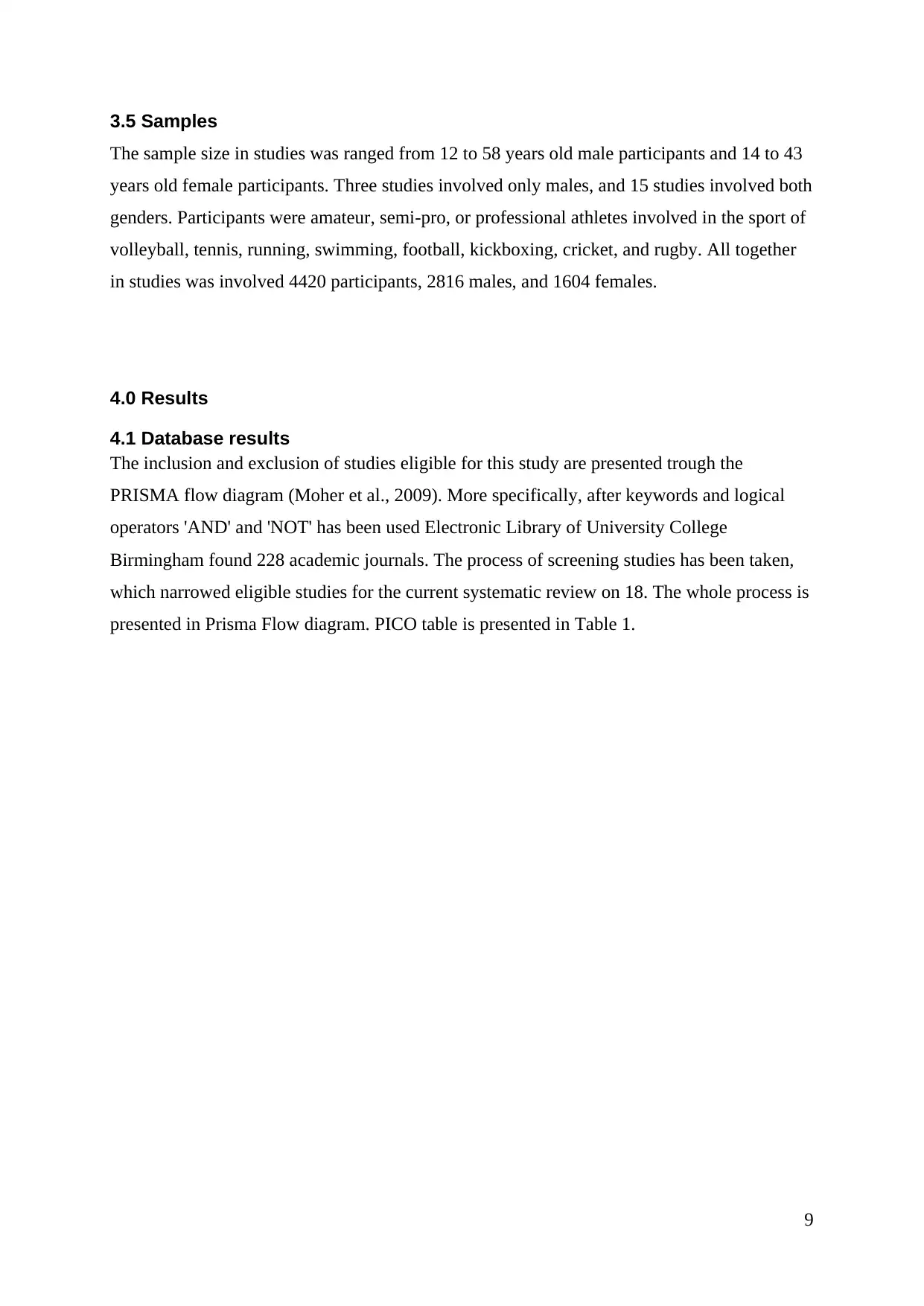
3.5 Samples
The sample size in studies was ranged from 12 to 58 years old male participants and 14 to 43
years old female participants. Three studies involved only males, and 15 studies involved both
genders. Participants were amateur, semi-pro, or professional athletes involved in the sport of
volleyball, tennis, running, swimming, football, kickboxing, cricket, and rugby. All together
in studies was involved 4420 participants, 2816 males, and 1604 females.
4.0 Results
4.1 Database results
The inclusion and exclusion of studies eligible for this study are presented trough the
PRISMA flow diagram (Moher et al., 2009). More specifically, after keywords and logical
operators 'AND' and 'NOT' has been used Electronic Library of University College
Birmingham found 228 academic journals. The process of screening studies has been taken,
which narrowed eligible studies for the current systematic review on 18. The whole process is
presented in Prisma Flow diagram. PICO table is presented in Table 1.
9
The sample size in studies was ranged from 12 to 58 years old male participants and 14 to 43
years old female participants. Three studies involved only males, and 15 studies involved both
genders. Participants were amateur, semi-pro, or professional athletes involved in the sport of
volleyball, tennis, running, swimming, football, kickboxing, cricket, and rugby. All together
in studies was involved 4420 participants, 2816 males, and 1604 females.
4.0 Results
4.1 Database results
The inclusion and exclusion of studies eligible for this study are presented trough the
PRISMA flow diagram (Moher et al., 2009). More specifically, after keywords and logical
operators 'AND' and 'NOT' has been used Electronic Library of University College
Birmingham found 228 academic journals. The process of screening studies has been taken,
which narrowed eligible studies for the current systematic review on 18. The whole process is
presented in Prisma Flow diagram. PICO table is presented in Table 1.
9
⊘ This is a preview!⊘
Do you want full access?
Subscribe today to unlock all pages.

Trusted by 1+ million students worldwide
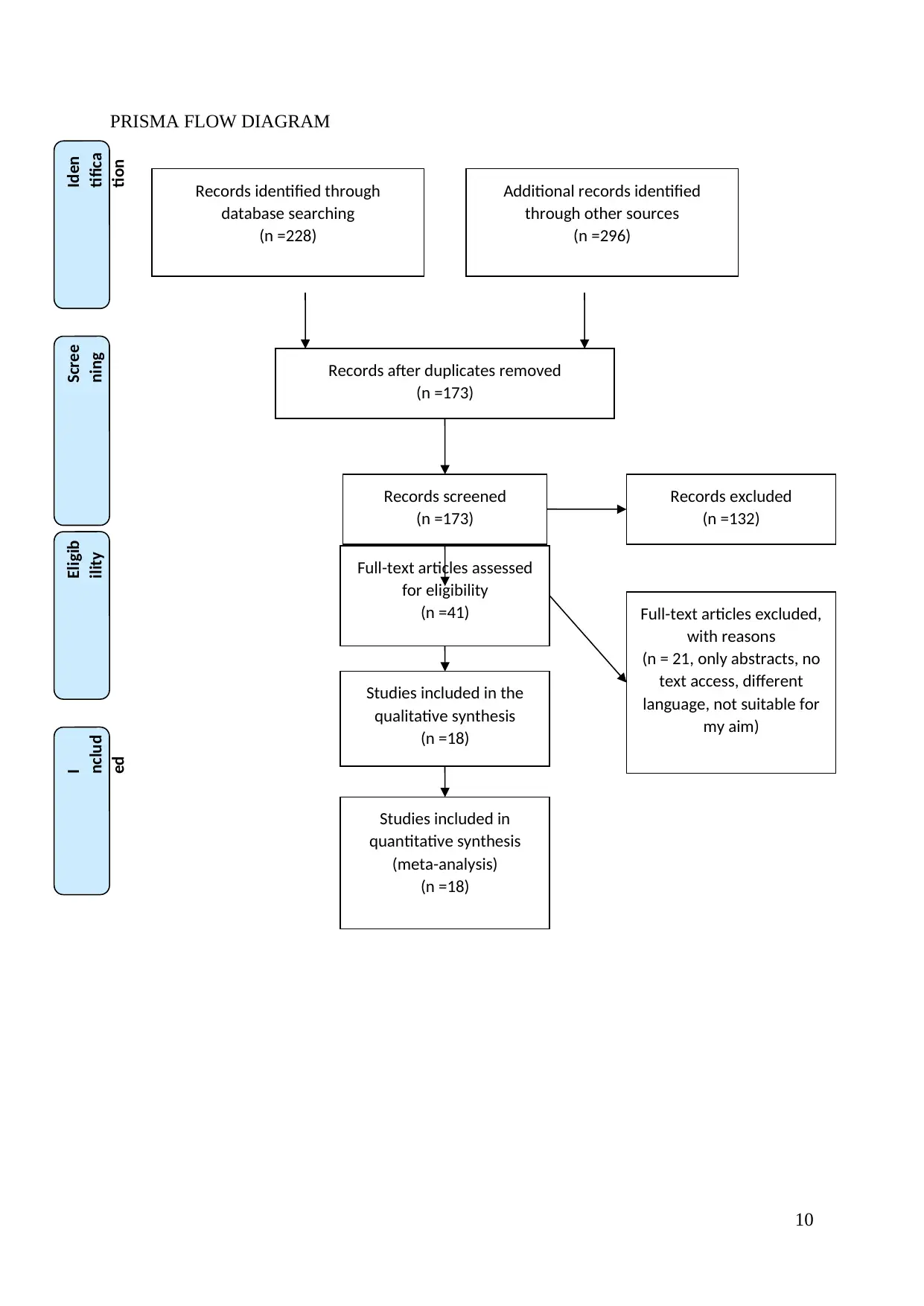
PRISMA FLOW DIAGRAM
10
Full-text articles excluded,
with reasons
(n = 21, only abstracts, no
text access, different
language, not suitable for
my aim)
Records identified through
database searching
(n =228)
Scree
ning
I
nclud
ed
Eligib
ility
Iden
tifica
tion
Additional records identified
through other sources
(n =296)
Records after duplicates removed
(n =173)
Records screened
(n =173)
Records excluded
(n =132)
Full-text articles assessed
for eligibility
(n =41)
Studies included in the
qualitative synthesis
(n =18)
Studies included in
quantitative synthesis
(meta-analysis)
(n =18)
10
Full-text articles excluded,
with reasons
(n = 21, only abstracts, no
text access, different
language, not suitable for
my aim)
Records identified through
database searching
(n =228)
Scree
ning
I
nclud
ed
Eligib
ility
Iden
tifica
tion
Additional records identified
through other sources
(n =296)
Records after duplicates removed
(n =173)
Records screened
(n =173)
Records excluded
(n =132)
Full-text articles assessed
for eligibility
(n =41)
Studies included in the
qualitative synthesis
(n =18)
Studies included in
quantitative synthesis
(meta-analysis)
(n =18)
Paraphrase This Document
Need a fresh take? Get an instant paraphrase of this document with our AI Paraphraser
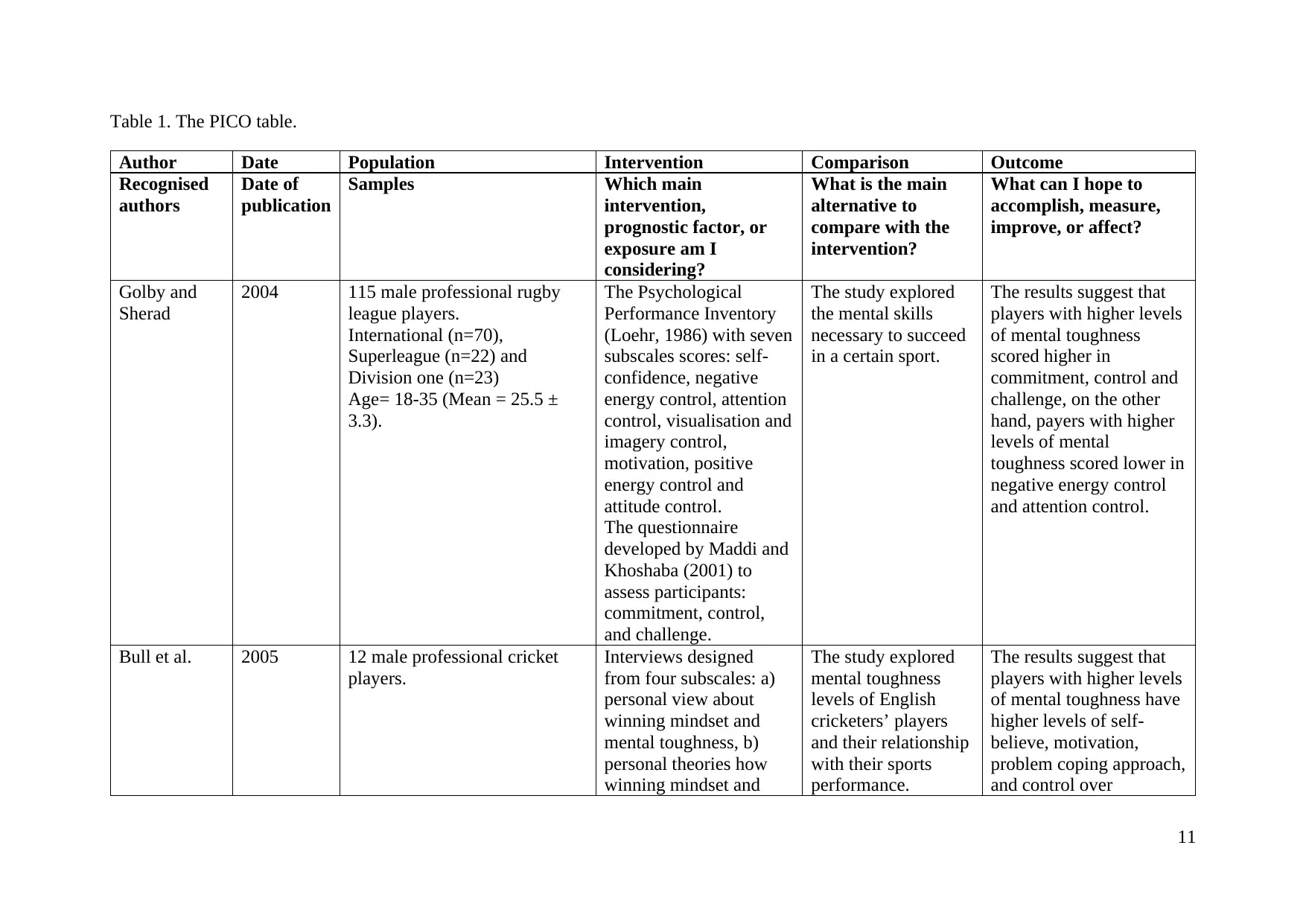
Table 1. The PICO table.
Author Date Population Intervention Comparison Outcome
Recognised
authors
Date of
publication
Samples Which main
intervention,
prognostic factor, or
exposure am I
considering?
What is the main
alternative to
compare with the
intervention?
What can I hope to
accomplish, measure,
improve, or affect?
Golby and
Sherad
2004 115 male professional rugby
league players.
International (n=70),
Superleague (n=22) and
Division one (n=23)
Age= 18-35 (Mean = 25.5 ±
3.3).
The Psychological
Performance Inventory
(Loehr, 1986) with seven
subscales scores: self-
confidence, negative
energy control, attention
control, visualisation and
imagery control,
motivation, positive
energy control and
attitude control.
The questionnaire
developed by Maddi and
Khoshaba (2001) to
assess participants:
commitment, control,
and challenge.
The study explored
the mental skills
necessary to succeed
in a certain sport.
The results suggest that
players with higher levels
of mental toughness
scored higher in
commitment, control and
challenge, on the other
hand, payers with higher
levels of mental
toughness scored lower in
negative energy control
and attention control.
Bull et al. 2005 12 male professional cricket
players.
Interviews designed
from four subscales: a)
personal view about
winning mindset and
mental toughness, b)
personal theories how
winning mindset and
The study explored
mental toughness
levels of English
cricketers’ players
and their relationship
with their sports
performance.
The results suggest that
players with higher levels
of mental toughness have
higher levels of self-
believe, motivation,
problem coping approach,
and control over
11
Author Date Population Intervention Comparison Outcome
Recognised
authors
Date of
publication
Samples Which main
intervention,
prognostic factor, or
exposure am I
considering?
What is the main
alternative to
compare with the
intervention?
What can I hope to
accomplish, measure,
improve, or affect?
Golby and
Sherad
2004 115 male professional rugby
league players.
International (n=70),
Superleague (n=22) and
Division one (n=23)
Age= 18-35 (Mean = 25.5 ±
3.3).
The Psychological
Performance Inventory
(Loehr, 1986) with seven
subscales scores: self-
confidence, negative
energy control, attention
control, visualisation and
imagery control,
motivation, positive
energy control and
attitude control.
The questionnaire
developed by Maddi and
Khoshaba (2001) to
assess participants:
commitment, control,
and challenge.
The study explored
the mental skills
necessary to succeed
in a certain sport.
The results suggest that
players with higher levels
of mental toughness
scored higher in
commitment, control and
challenge, on the other
hand, payers with higher
levels of mental
toughness scored lower in
negative energy control
and attention control.
Bull et al. 2005 12 male professional cricket
players.
Interviews designed
from four subscales: a)
personal view about
winning mindset and
mental toughness, b)
personal theories how
winning mindset and
The study explored
mental toughness
levels of English
cricketers’ players
and their relationship
with their sports
performance.
The results suggest that
players with higher levels
of mental toughness have
higher levels of self-
believe, motivation,
problem coping approach,
and control over
11
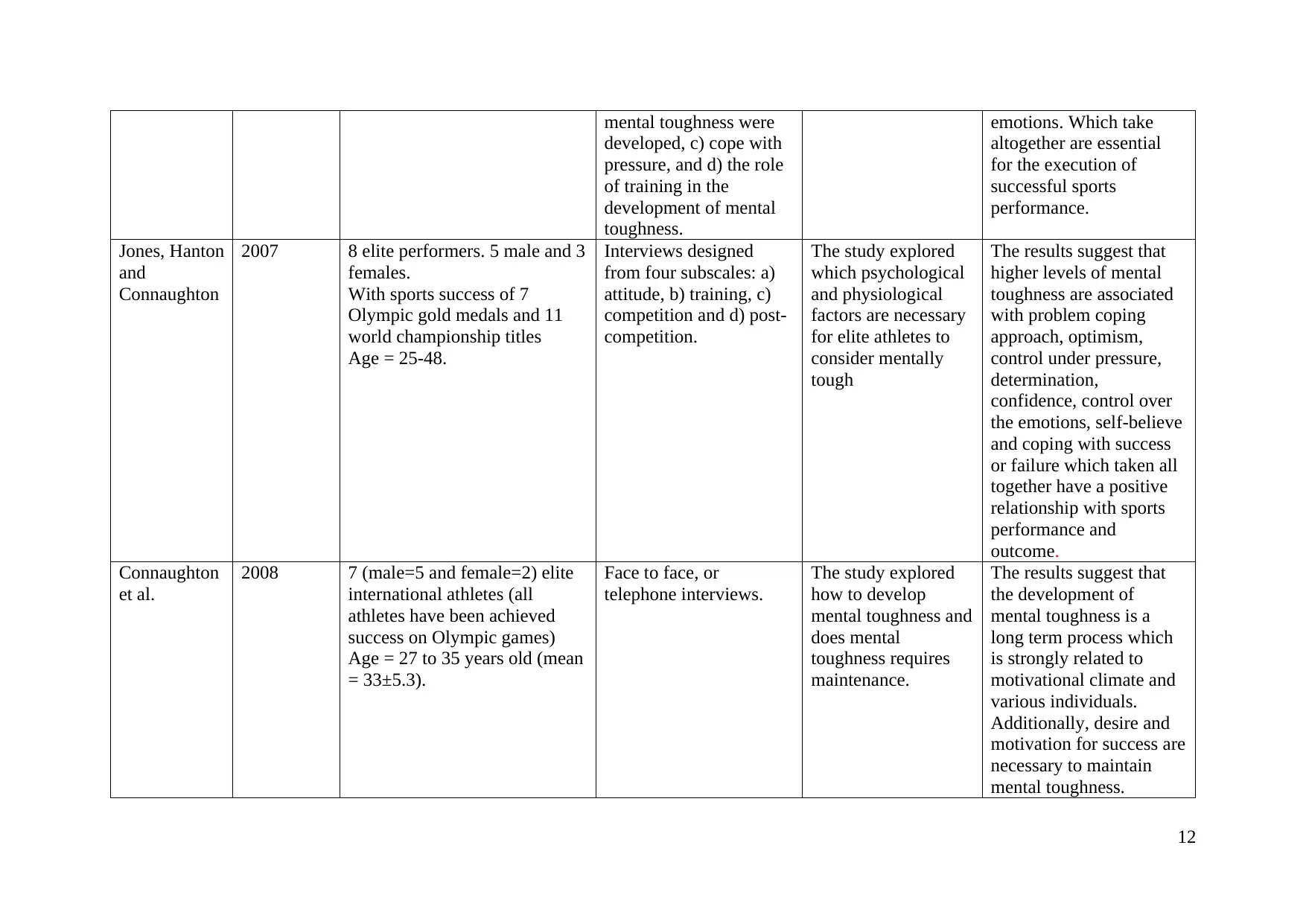
mental toughness were
developed, c) cope with
pressure, and d) the role
of training in the
development of mental
toughness.
emotions. Which take
altogether are essential
for the execution of
successful sports
performance.
Jones, Hanton
and
Connaughton
2007 8 elite performers. 5 male and 3
females.
With sports success of 7
Olympic gold medals and 11
world championship titles
Age = 25-48.
Interviews designed
from four subscales: a)
attitude, b) training, c)
competition and d) post-
competition.
The study explored
which psychological
and physiological
factors are necessary
for elite athletes to
consider mentally
tough
The results suggest that
higher levels of mental
toughness are associated
with problem coping
approach, optimism,
control under pressure,
determination,
confidence, control over
the emotions, self-believe
and coping with success
or failure which taken all
together have a positive
relationship with sports
performance and
outcome.
Connaughton
et al.
2008 7 (male=5 and female=2) elite
international athletes (all
athletes have been achieved
success on Olympic games)
Age = 27 to 35 years old (mean
= 33±5.3).
Face to face, or
telephone interviews.
The study explored
how to develop
mental toughness and
does mental
toughness requires
maintenance.
The results suggest that
the development of
mental toughness is a
long term process which
is strongly related to
motivational climate and
various individuals.
Additionally, desire and
motivation for success are
necessary to maintain
mental toughness.
12
developed, c) cope with
pressure, and d) the role
of training in the
development of mental
toughness.
emotions. Which take
altogether are essential
for the execution of
successful sports
performance.
Jones, Hanton
and
Connaughton
2007 8 elite performers. 5 male and 3
females.
With sports success of 7
Olympic gold medals and 11
world championship titles
Age = 25-48.
Interviews designed
from four subscales: a)
attitude, b) training, c)
competition and d) post-
competition.
The study explored
which psychological
and physiological
factors are necessary
for elite athletes to
consider mentally
tough
The results suggest that
higher levels of mental
toughness are associated
with problem coping
approach, optimism,
control under pressure,
determination,
confidence, control over
the emotions, self-believe
and coping with success
or failure which taken all
together have a positive
relationship with sports
performance and
outcome.
Connaughton
et al.
2008 7 (male=5 and female=2) elite
international athletes (all
athletes have been achieved
success on Olympic games)
Age = 27 to 35 years old (mean
= 33±5.3).
Face to face, or
telephone interviews.
The study explored
how to develop
mental toughness and
does mental
toughness requires
maintenance.
The results suggest that
the development of
mental toughness is a
long term process which
is strongly related to
motivational climate and
various individuals.
Additionally, desire and
motivation for success are
necessary to maintain
mental toughness.
12
⊘ This is a preview!⊘
Do you want full access?
Subscribe today to unlock all pages.

Trusted by 1+ million students worldwide
1 out of 44
Related Documents
Your All-in-One AI-Powered Toolkit for Academic Success.
+13062052269
info@desklib.com
Available 24*7 on WhatsApp / Email
![[object Object]](/_next/static/media/star-bottom.7253800d.svg)
Unlock your academic potential
Copyright © 2020–2026 A2Z Services. All Rights Reserved. Developed and managed by ZUCOL.





